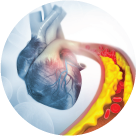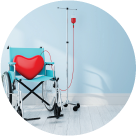Cardiologist’s Validated Precise
ECG Reporting

Honest Pricing

Highly Experienced Radiologists

Advanced Imaging Diagnostics

Trusted, Transparent & Affordable

What is an ECG test?
An ECG or an electrocardiogram test is a non-invasive and painless diagnostic procedure that helps in the detection of heart issues as well as monitoring the overall heart health.
An ECG monitors the electrical activity of the heart as each heartbeat generates an electronic pulse that travels through the heart.
The electrical pulse contracts the arterial muscles which in turn pump the blood from the heart. The test detects and identifies any abnormal electrical activity, indicative of a heart illness or the risk of one.
The ECG checks for the electrical impulses made with each heartbeat which is displayed as ‘waves’ on the ECG machine. These impulses are categorised in three waves, namely:
- First wave: The first wave is generated from the heart’s upper chambers and is known as the ‘P’ wave. This wave is followed by a flat line when the electrical impulse reaches the heart’s bottom chambers.
- Second wave: The second wave is generated by the left and right bottom chambers with each electrical pulse. This wave is also known as the QRS Complex.
- Third-wave: The third and final wave is known as the T wave, which indicates the ventricles going into a resting phase.
The ECG test is the ideal diagnostics tool to determine optimal functioning of the heart by evaluating the time it takes for the electrical pulses to pass through the heart.
This helps the doctor to determine whether the heart’s activity is normal, fast, slow or irregular.
Why is an ECG required?

To detect heart arrhythmia

To detect blocked arteries

To detect heart damage

To detect heart damage

To determine optimal heart rate
Frequently asked questions
The normal range of ECG differs between men and women. For men, the normal range is 49 to 100 BPM, and for women, it is 55 to 108 BPM. Here, BPM stands for ‘beats per minute’.
An ECG test can help in recognizing the signs of blocked arteries, but cannot deliver accurate results related to heart blockage.
- Chest pain
- Heart palpitations
- Dizziness
- Shortness of breath
Yes, stress can cause abnormal ECG because it impacts the components of the signal-averaged ECG.
Typically, an ECG test takes about 15 minutes to complete.
Unlike other diagnostic tests, the results of an ECG test are available immediately post-examination.
An ECG test records and evaluates your heart rate and rhythm to identify any discrepancies that might be indicative of an existing heart ailment or the risk of one.
Before an ECG, avoid taking cold water and exercising. Drinking cold water can alter the heart’s electrical patterns during the tests, while exercising before the examination can elevate your heart rate, thus interfering with the correct results.
